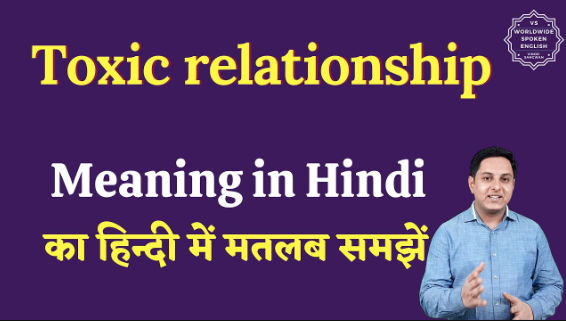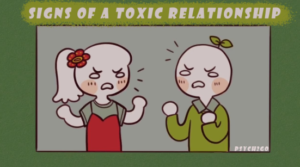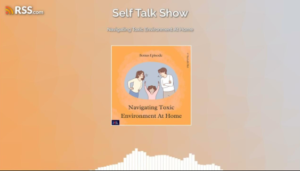Toxic Relationship Meaning in Hindi: संबंधों की जहरीली सच्चाई

विषाक्त संबंध का अर्थ है ऐसे रिश्ते, जहां व्यक्तिगत भलाई और सम्मान की कमी होती है। ये संबंध प्रायः हानिकारक और चुनौतीपूर्ण होते हैं। Toxic relationships often thrive on patterns of abuse, manipulation, and emotional harm. They drain energy and joy, impeding personal growth and happiness.
Recognizing these harmful dynamics is crucial for mental and emotional well-being. Such relationships are marked by a lack of support, constant conflict, and a persistent imbalance of power, where one person may feel trapped or belittled. It’s not just about the frequent arguments or disagreements; it’s about an ongoing, damaging interaction pattern that deteriorates the quality of life for those involved.
Breaking free from a toxic relationship is essential to regaining a sense of self-worth and establishing healthier interpersonal connections.
Toxic Relationship Traits

Toxic Relationship Traits एक ऐसा मुद्दा है जो कई लोगों के जीवन में चिंता का कारण बनता है। विषाक्त संबंध वे होते हैं जहाँ संबंधों में स्वास्थ्यकर बातचीत की कमी होती है। यह किसी के व्यक्तित्व, आत्मा और खुशी पर गहरा प्रभाव डाल सकता है।
Common Signs Of Toxicity
- अनादर की भावनाएँ आम होती हैं।
- साथी द्वारा नियंत्रण और अत्यधिक ईर्ष्या दिखाई देती है।
- संचार में समस्याएँ होती हैं।
- एक दूसरे की आलोचना होती रहती है।
- भावनात्मक ब्लैकमेल का उपयोग होता है।
- दायित्वों का असमान वितरण होता है।
Emotional And Psychological Impact
विषाक्त संबंधों का मानसिक स्वास्थ्य पर गंभीर प्रभाव होता है।
| प्रभाव | विवरण |
| चिंता | परेशानी और चिंता की बढ़ती भावनाएँ। |
| अवसाद | खुद को अकेला और उदास महसूस करना। |
| कम आत्म–सम्मान | खुद के प्रति सम्मान की कमी। |
| तनाव | निरंतर तनाव और संघर्ष की स्थिति। |
| सोच में परिवर्तन | नकारात्मक सोच और परिप्रेक्ष्य। |
Culture And Toxic Relationships
Toxic relationships often bloom unseen in the garden of personal bonds. Culture shapes our views and relationships. In Indian society, specific patterns are common. These patterns sometimes lead to toxic relationships. Understanding these cultural aspects is crucial. It helps us recognize and address toxicity.
Influence Of Indian Society
In India, social norms influence personal relationships. Respect for elders is deep-rooted. It sometimes silences the youth. This silence can breed toxicity. Peer pressure also plays a role. It pushes people into unhealthy dynamics.
- The collectivist mindset prioritizes group harmony over individual well-being.
- Maintaining social image may lead to overlooking red flags.
- Patriarchal values can result in controlling behaviours.
Family Dynamics And Expectations
Families are the backbone of Indian culture. However, some expectations can harm us. Parents often decide whom their children marry. They may overlook their children’s happiness, leading to resentment and suffering.
| Expectation | Impact |
| Undying loyalty to family | Leads to suppression of personal needs |
| Marrying within the same caste/community | Limits freedom of choice and can foster unhappiness |
| Continuing family legacy or business | Forces career paths, stifling personal goals |
- Families teach children to respect traditions over desires.
- Unwritten rule: Never bring shame to the family name.
- Pressure to maintain family unity may excuse toxic behavior.
Communication Breakdown
रिश्तों में संचार टूटना तनाव बढ़ाता है। इस खंड का उद्देश्य टॉक्सिक रिश्तों में संचार की खामियां समझना है। सही बातचीत न होने पर मनमुटाव होता है। आइए, नकारात्मक पैटर्न और स्वस्थ संवाद में बाधाओं को देखें।
Patterns Of Negative Interactions
- आलोचना: एक दूसरे की कमियां निकालना।
- अवहेलना: भावनाओं की अनदेखी।
- रक्षात्मकता: गलती स्वीकार न करना।
- स्टोनवॉलिंग: चुप्पी साध लेना।
Barriers To Healthy Dialogue
स्वस्थ वार्तालाप की बाधाएं तालमेल ख़राब करती हैं।
| बाधा | वर्णन |
| विश्वास का अभाव | संवाद में ईमानदारी नहीं। |
| असम्मान | एक दूसरे की राय का अनादर। |
| इल्ज़ाम | गलती का ठीकरा दूसरे पर फोड़ना। |
| भावनात्मक दूरी | भावनाओं को साझा न करना। |
इन बाधाओं से टॉक्सिक संबंध और बिगड़ते हैं। संवाद हमेशा रिश्तों की मजबूती की नींव होता है। इन बाधाओं की पहचान और समाधान सुखी साझेदारी की दिशा में पहला कदम है।
Control And Dependency Issues
Often, toxic relationships have control and dependency issues at their core. A partner may try to have the upper hand in the relationship. This creates a harmful atmosphere for both individuals involved.
Power Imbalances Explained
A power imbalance occurs when one person holds more control over the relationship. This unfair advantage can show up in different ways:
- Financial control: One partner manages all the money.
- Emotional dominance: One person’s feelings always take priority.
- Decision supremacy: Only one partner makes the choices.
Independence Versus Co-dependence
Understanding the difference between independence and co-dependence is vital. Independence is when both partners can function on their own. They support each other but do not rely solely on each other for their needs or happiness. Co-dependence involves a partner needing the other too much. This often leads to one partner sacrificing their own needs for the other. Let’s break down each one:
| Independence | Co-dependence |
| Personal growth is encouraged. | One partner’s growth is often limited. |
| Both have separate interests. | Interests are often shared, sometimes one-sided. |
| They have individual goals. | Goals are mostly shared or focused on one partner. |
Self-esteem And Toxicity
Self-Esteem and Toxicity का संबंध बहुत गहरा होता है। Toxic relationship, जिसे हिंदी में विषाक्त संबंध कहते हैं, वो आत्म-सम्मान पर बड़ा असर डालते हैं। यह संबंध अक्सर हमारे मूल्य और योग्यता पर प्रश्न चिह्न लगा देते हैं। बदलाव की यात्रा में, पहचानना महत्वपूर्ण है कि यह प्रक्रिया कई बार दर्दनाक हो सकती है, लेकिन स्वस्थ भविष्य के लिए जरूरी भी। आइए जानते हैं कैसे।
Impact On Personal Worth
व्यक्तिगत मूल्य पर विषाक्त संबंधों का प्रभाव गहरा होता है। किसी के साथ रहते हुए यदि लगातार नकारात्मकता का सामना करना पड़े, तो इंसान खुद को कमतर मानने लगता है।
- आत्म-सम्मान घटता है।
- खुद पर विश्वास कम हो जाता है।
- निरंतर अपमान से आत्मछवि प्रभावित होती है।
Breaking The Cycle Of Self-doubt
आत्म-संदेह का चक्र तोड़ना महत्वपूर्ण है। पहला कदम है स्वीकारोक्ति की दिशा में बढ़ना।
- अपने मन की बात को पहचानें।
- मदद के लिए आगे आएँ।
- सकारात्मक आदतें बनाएँ।
व्यक्तिगत विकास और स्व–सम्मान विषाक्त संबंध से मुक्ति की ओर ले जाते हैं।
Recognizing Emotional Abuse
Recognizing Emotional Abuse यानी भावनात्मक शोषण की पहचान बिना चोट के भी सम्बन्धों में विषैलापन ला सकती है। यह कई रूप लेकर सामने आता है। प्रेम और समर्थन के आवरण में छिपा यह अत्याचार, सामान्यतः ध्यान नहीं जाता। पर इसे पहचानना ज़रूरी है।
Subtle Forms Of Manipulation
सूक्ष्म जाल से शुरू होते हैं भावनात्मक शोषण के संकेत।
- दोषारोपण व्यक्ति को हमेशा गलत ठहराना।
- अवमूल्यन तानों और उपेक्षा से खुद को छोटा महसूस करवाना।
- इरादों पर सवाल हर कदम पर संदेह और बहस।
- अतिरिक्त नियंत्रण निजी स्थान और अधिकारों का हनन।
Consequences Of Long-term Abuse
लंबे समय तक चलने वाले शोषण के परिणाम गंभीर हो सकते हैं।
- स्वास्थ्य समस्याएं तनाव, अवसाद, अनिद्रा जैसी समस्याए।
- आत्मसम्मान की कमी खुद पर भरोसा करने में असमर्थता।
- सामाजिक अलगाव दोस्तों और परिवार से कटाव।
- विकास की कमी व्यक्तिगत और व्यावसायिक जीवन में ठहराव।
Navigating Out Of Toxicity

Taking steps to leave a toxic relationship can be challenging. It means putting your well-being first. Realize that it’s essential for a happier life. Let’s talk about moving towards healthy bonds.
Steps Towards Healthier Interactions
Building healthy relationships starts with self-awareness. Know what you deserve. Follow these steps:
- Set Boundaries: Decide what is okay and not okay.
- Communicate Clearly: Talk openly about your feelings.
- Stay True to Yourself: Don’t change to suit others.
- Know Your Worth: Remember, you deserve respect.
- Walk Away: Sometimes, the best choice is to leave.
Seeking Support From Others
You don’t have to deal with this alone. Get help from trusted people. Support can come in different ways:
| Source of Support | How They Can Help |
| Friends and Family | Providing a listening ear or practical advice. |
| Professionals | Counselling or guidance to make informed decisions. |
| Support Groups | I am connecting with others who have faced similar situations. |
Create a support network and embrace positive change. It’s about time to prioritize self-care. Remember, reaching out is a sign of strength.
Healing And Recovery
Healing and Recovery from a toxic relationship is a brave journey. It includes understanding what went wrong and learning how to heal emotionally. This path allows individuals to emerge more robust and more self-aware. The road to Recovery involves building personal resilience, seeking therapy, and embracing supportive counselling. The process helps individuals regain their emotional balance and flourish post-toxicity.
Building Resilience
Building resilience is pivotal for healing. It means growing tough against stress and adversity.
- Accept and understand your emotions.
- Set boundaries to protect your well-being.
- Engage in activities that bring joy and satisfaction.
- Develop a robust support system of friends and family.
- Practice self-care and make time for yourself.
Resilience only emerges after some time. It needs time, patience, and persistent effort.
The Role Of Therapy And Counseling
Therapy and counselling play a significant role in healing. Professionals guide you through the complexities of emotions.
- Therapy provides a safe space to express feelings.
- Counsellors offer strategies for dealing with difficult emotions.
- They help rebuild self-esteem and confidence.
- They support in setting goals for a healthier future.
Professional help can accelerate the healing process. It equips individuals with tools to maintain emotional health.
| Healing Step | Benefits |
| Understanding Emotions | Clarity and Peace |
| Setting Boundaries | Personal Protection |
| Self-Care | Improved Well-being |
| Seeking Therapy | Guided Recovery |
Conclusion
Understanding the nuances of a toxic relationship is crucial for well-being. हिंदी में ‘विषाक्त संबंधों’ की पहचान कर, हम अपने जीवन को बेहतर बना सकते हैं। Let’s embrace healthier bonds, स्वस्थ संबंधों की ओर बढ़ें, and promote positive interactions. सशक्तिकरण की यह यात्रा हमें सुखद भविष्य की ओर ले जाए।



